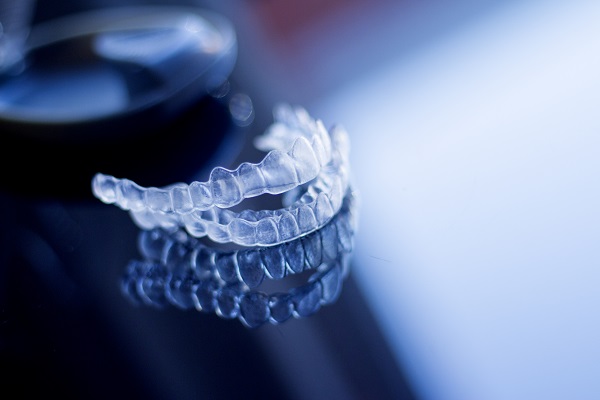Invisalign vs. Braces: Which Works Better?

Invisalign® is newer to the dental industry, and it has grown in popularity since emerging. It offers similar goals as braces do; however, the process is quite different. When considering straightening crooked teeth or correcting uneven bites, most people turn to their dentist for help. Dentists tend to recommend braces or Invisalign®, but many people are wondering which is better.
Does Invisalign® work better than braces?
Outlined below is information on both Invisalign® and braces, both of which are popular orthodontic options. Keep reading to find out which is better!
Braces
Braces have been used for years, and they are recognized as the most commonly used orthodontic treatment option. They rely on metal wires and brackets to individually straighten each tooth over time. One bracket is cemented onto the front of each tooth, and the wires feed through each bracket, connecting them all together. Over time, the teeth will shift into the desired position.
Additionally, braces can be used to correct under and overbites; however, they will also require bands to help pull the upper or lower arch forward, thus correcting the bite. Braces treatment can take anywhere from a few months to two years, depending on the severity of the patient's misalignment. Problems with the bite may take longer to correct, whereas crooked or crowding teeth may shift quicker.
Invisalign®
Invisalign® is much different than braces in the way that it appears and works. Instead of relying on metal wires and brackets, Invisalign® uses clear aligners that are custom-made to fit the patient's teeth, whether it be the upper or lower arch. The aligners are removable, which allows for flexibility and an easier treatment process. However, with flexibility comes the need for discipline. Because Invisalign® is removable, patients are more prone to taking them out throughout the day, which can delay treatment.
Dentists recommend Invisalign® for patients that have minor problems, as opposed to major ones. Typically, the aligners cannot address jaw malfunctions either. Most dentists state that patients with small spaces or minor crowding will benefit greatly from Invisalign®. Because Invisalign® works well for minor problems, treatment usually does not take as long as it does with braces.
Which is better?
In short, one option is not better than the other. However, certain patients may respond better to Invisalign® depending on their situation. It is important to outline goals and desires prior to deciding on Invisalign® or braces.
If there are major problems with the teeth and jaw, then the patient may respond better to traditional braces. However, if there are minor imperfections with the teeth, then Invisalign® might be a great option. Additionally, some dentists combine both treatments, where the patient starts with braces and ends with Invisalign®.
Learn more today!
Interested in Invisalign®? When considering orthodontic treatment, working with a dentist is a great place to start! They can perform an evaluation to determine whether braces or Invisalign® is the best option. Additionally, the dentist can go over preferences, goals and needs. Reach out today to get started or to learn more!
Request an appointment here: https://www.dentistofvisalia.com or call Visalia Care Dental at (559) 975-1213 for an appointment in our Visalia office.
Check out what others are saying about our services on Yelp: Read our Yelp reviews.
Related Posts
You may need a type of dental restoration at some point in your life. There are many types of treatments available. Knowing how to select each one can give you the results that you need. Here are some tips on how to choose the right type of dental restoration procedure that will fit your dental…
Many people underestimate the importance of regular visits with a general dentist. They assume that daily brushing and flossing are enough. While at-home care is crucial, routine dental checkups ensure long-term dental health and prevent oral health complications.A general dentist functions much like a primary care provider for a person's mouth, serving as the first…
A strong and stable dental restoration can replace your missing tooth. Many people suffer from tooth loss. Using removable dentures is a way to fill the dental space. This can prevent many dental issues from developing. Here are the dental restoration options available for your missing tooth.The dentist will assess the patient’s mouth and see…
A root canal removes the infected pulp, then cleans and seals the tooth. Many patients may be unsure if there is anything else they need to do after the root canal. The answer is yes; they will need a dental restoration to restore the tooth's functionality. Let us dive into why leaving a treated tooth…
